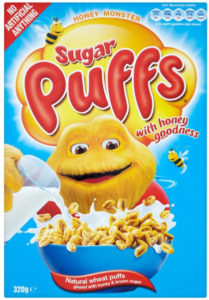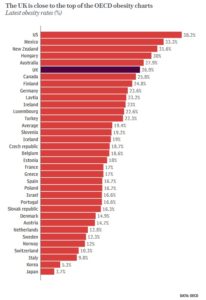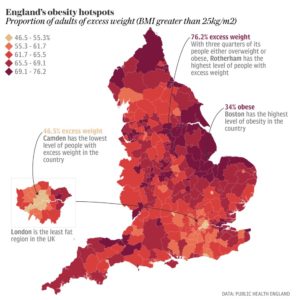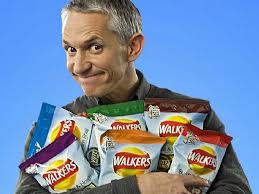
The UK Health Secretary, Jeremy Hunt, is proposing legislation to reduce the escalation of child obesity. Are the measures too little too late?
The Daily Telegraph1 covered this story recently and pointed out the following changes that might be on the the Health Secretary’s obesity hit list:
- supermarkets may have to ban the “guilt lanes” at supermarket checkouts (where children can strong-arm their parents for them to buy chocolates and crisps, etc) as well as at stores entrances
- the two-for-one offers on junk food might be a thing of the past (it might be a good idea to replace them with fruit and nuts)
- there may be a limit on those “unlimited refills” of high sugar fizzy drinks in sugar that are so common now in fast foods restaurants
- a 9 pm watershed on advertising products high in sugar and salt from 2020 could be imposed on TV advertisers
- using cartoon characters and celebrities to promote junk food might become illegal
- a ban on retailers from selling energy drinks to under-16 year olds
- stopping online junk food adverts that target children
 These policies were outlined in the Government’s child obesity strategy2 . Of course, nothing will happen until the above become law, and there’s many a slip twixt cup and lip, especially since Ministers from other departments are currently being consulted on the plans – and we know the pressure that the food and retail industries are able to put on Ministers…
These policies were outlined in the Government’s child obesity strategy2 . Of course, nothing will happen until the above become law, and there’s many a slip twixt cup and lip, especially since Ministers from other departments are currently being consulted on the plans – and we know the pressure that the food and retail industries are able to put on Ministers…
The above strategy claims that retailers have taken the “first steps” in tackling obesity. This is like trusting wolves to look after the health of lambs. The strategy states: “Where food is placed in shops and how it is promoted can influence the way we shop and it is more common for HFSS (high in fat, sugar and salt) products to be placed in the most prominent places in store as well as sold on promotion, e.g. with ‘buy one get one free’ offers…Whilst some retailers have taken the first steps to redressing this by removing confectionery from checkouts or restricting price promotions, we believe that wherever parents shop they shouldn’t be bombarded with HFSS products.”
The UK government did bring out its first child obesity strategy in in August 20163 , but, true to form, it became significantly watered down under predictable pressure from industry campaigners. Once again, profits over public health.
The following plans in that 2016 strategy were dumped:
- restriction on promotion on unhealthy snacks
- an advertising watershed
- banning junk food at checkouts
- plans for a legal maximum level of sugar in products
 The fact that the above were booted out in 2016 doesn’t give the greatest hope for them being included in future strategies. What a cynic I am! But can you really see Tony Tiger, the Milky Bar Kid and the Honey Monster being banned from promoting sugary snacks? and Gary Lineker barred from advertising Walkers crisps?
The fact that the above were booted out in 2016 doesn’t give the greatest hope for them being included in future strategies. What a cynic I am! But can you really see Tony Tiger, the Milky Bar Kid and the Honey Monster being banned from promoting sugary snacks? and Gary Lineker barred from advertising Walkers crisps?
Some supermarkets (such as Waitrose) have started to make changes. The strategy states: “Many larger retailers and supermarkets have followed Waitrose in voluntarily introducing a ban on the sale of energy drinks to under-16s. We applaud their positive action in this space. However there are large numbers of retailers who have not imposed such a restriction. It is important for us to create a level playing field for businesses so that retailers that take action on this issue are not disadvantaged, and to stop children from simply switching from one retail outlet to another to buy energy drinks. We will therefore consult before the end of 2018 on our intention to introduce legislation to end the sale of energy drinks to children by all retailers.”
Figures published earlier this week4 revealed that more than 22,000 children will leave UK primary schools dangerously obese this year.
The UK is close to the top of the OECD obesity charts, as can be seen from the following OECD Obesity chart. If you want to avoid obesity, it appears that eating like the Japanese is not a bad idea.
Latest obesity rates (%)5

And if you want to see which areas in England have the highest levels of obesity, the following UK government map6 should give you an idea.

I am doubtful that anything major will be done to tackle obesity within the forthcoming government strategy paper. It appears to me that the government is ignoring the elephant in the room – the fact that our overall diets are killing us. Tinkering with the edges of the problem at supermarket tills and in TV adverts is, of course, a useful starting point; but I suspect that real change will only come when pressure on the NHS (UK’s National Health Service) is sufficient to justify obese people being banned from operations and treatment unless they lose weight. Once this starts to happen, the increasingly large obese section of our populations will put such pressure on politicians that they will have to introduce draconian legislation which, I hope, will take into account the benefits of WFPB diets and the elimination of processed junk foods once and for all.
I live in hope, or should that be – I live in a fool’s paradise?

References
- Supermarket ‘guilt-lanes’ and two-for-one junk food offers will be banned to tackle child obesity. Daily Telegraph 1st June 2018. Article by Steven Swinford. [↩]
- Department of Health and Social Care: The Government’s mandate to NHS England for 2018-19 [↩]
- HM Government Childhood Obesity. A Plan for Action 2016 [↩]
- Local government Association: 22,000 children severely obese when they leave primary school, 29th May 2018 [↩]
- OECD Obesity Update 2017 [↩]
- Gov.UK Guidance: Health matters: obesity and the food environment. Published 31 March 2017 [↩]